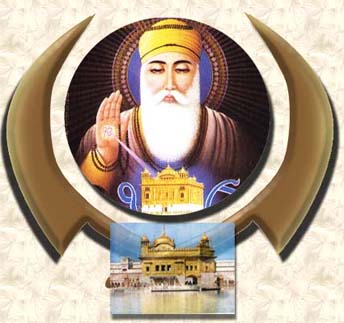|
|
| History and Practices The founder of the Sikh religion was Guru Nanak who was born in 1469. He preached a message of love and understanding and criticized the blind rituals of the Hindus and Muslims. Guru Nanak passed on his leadership of the Sikhs and his enlightened spirit to nine successive Gurus. The final living Guru, Guru Gobind Singh died in 1708. In his lifetime Guru Gobind Singh established a new voluntary order of Sikhs, the Khalsa brotherhood (meaning 'The Pure'), soldier-saints. The Khalsa upheld the highest Sikh virtues and fought many battles to fight injustice and preserve Sikhism. The Khalsa are Sikhs who have undergone the baptism ceremony initiated by Guru Gobind Singh and who follow a Code of Conduct and wear five physical symbols of the brotherhood. One of the more noticeable symbols is the uncut hair which is kept in a bun and covered with a turban. Before his death Guru Gobind Singh declared that the Sikhs no longer needed a living Guru and appointed his successor as the Sikh Holy Book the Guru Granth Sahib. Guru Gobing Singh felt that all the wisdom needed by the Sikhs for guidance in their daily lives could be found in the Guru Granth Sahib, the eternal Guru of the Sikhs. The Guru Granth Sahib is unique in the world of religious scriptures because not only is it accorded the status of being the head of the Sikh religion, but besides the poetry of the Gurus, it also contains the writings of Hindu and Muslim Saints. Sikhism does not have priests, which were abolished by Guru Gobind Singh. The Guru felt that they had become corrupt and full of ego. Sikhs only have custodians of the Guru Granth Sahib(granthi), and any Sikh is free to read the Guru Granthi Sahib in the Gurdwara (Sikh Temple) or in their home. All people of all religions are welcome to the Gurdwara. A free community kitchen can be found at every Gurdwara which serves meals to all, community service is an important aspect of Sikhism. The most important religious center for the Sikhs is Harmandir Sahib (The Golden Temple) at Amritsar in Punjab. As the Vatican is to Catholics and Mecca to the Muslims so is The Golden Temple to Sikhs. |






